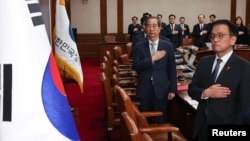SEOUL, SOUTH KOREA — South Korean lawmakers have impeached President Yoon Suk Yeol over his attempt to impose martial law, a high-stakes move that must now be approved by judges.
In a Saturday vote, 12 conservative lawmakers joined opposition forces to impeach Yoon, who is just halfway through his single five-year term. The impeachment suspends Yoon’s powers until the Constitutional Court decides whether to formally remove him from office.
In the interim, Prime Minister Han Duck-soo will serve as acting president.
In Washington, the White House said Saturday that U.S. President Joe Biden had spoken with Han, reaffirming, the statement said, "the ironclad commitment of the United States to the people of the ROK," using the abbreviation for South Korea’s formal name, the Republic of Korea.
Biden, the statement said, expressed confidence the alliance between the two countries would "remain the linchpin for peace and prosperity in the Indo-Pacific region" during Han’s tenure.
Minutes before the vote, Yoon’s ruling People Power Party announced its opposition to impeachment but allowed members to vote freely, unlike the case of last week’s boycotted effort. The decision, combined with the secret ballot, ultimately tipped the scales against Yoon.
The final vote was 204 in favor and 85 against.
Outside the National Assembly, a crowd estimated to be in the hundreds of thousands erupted in cheers.
“It is really a matter of common sense versus nonsense,” said 48-year-old Seoul resident Lee Shin-mu, who attended the protest with his wife and middle school-aged son. “I always believed that, if we just gave it some time, then impeachment would eventually happen.”
A look at the South Korean leader who has been impeached
Yoon declared martial law on December 3 — the first such decree since South Korea became a democracy in the 1980s — but lawmakers overturned the order within hours.
In a speech following his impeachment, Yoon remained defiant, insisting his impeachment was just a pause in his presidency.
"Although I am stopping for now, the journey I have walked with the people over the past 2½ years toward the future must never come to a halt. I will never give up," Yoon said.
Yoon has defended his move as legally justifiable, framing it as necessary to send a “strong message” to opposition lawmakers, whom he accused of being North Korea sympathizers obstructing his agenda. He also echoed far-right claims, suggesting that April’s legislative election was fraudulent.
The Constitutional Court has 180 days to rule on Yoon’s impeachment, but the process is filled with an unusual amount of uncertainty. Normally, six of the court’s nine justices must vote to uphold impeachment. However, with three seats vacant since October, all six remaining justices must agree for Yoon to be removed.
Daniel Pinkston, a Seoul-based international relations professor at Troy University, said he thinks it is likely the court will uphold the impeachment.
“It seems clear to me that he violated Article 77 of the constitution, which requires the president to notify the National Assembly ‘without delay’ that martial law has been declared,” said Pinkston.
“Yoon didn't do that. Furthermore, there is testimony from the police and the military that Yoon ordered them to prevent National Assembly members from convening in the building,” he said.
Many of the protesters were optimistic about the court upholding the verdict.
“Just like how the impeachment did not happen right away, there might be challenges, but if people continue to raise their voices, I believe we will eventually win,” said Lee Su-hyun, a 30-year-old woman who lives in Seoul.
If the court upholds the impeachment, South Korea must hold a presidential election within 60 days. If the court exonerates Yoon, he would return to office but could still face charges related to the martial law attempt.
Yoon is currently under investigation for treason, with three separate government probes underway. His office has been raided multiple times, and he is barred from leaving the country. Prosecutors have not ruled out arresting him.
While in office, South Korean presidents are immune from prosecution except in cases involving rebellion or treason.
Who is Han Duck-soo, South Korea's acting president after Yoon impeachment?
Han, the prime minister and caretaker president, is also in a politically precarious position. The opposition says it may impeach Han for his alleged role in the martial law attempt. Han, who has said he “consistently” opposed Yoon’s efforts, has vowed to participate in the investigations.





Forum